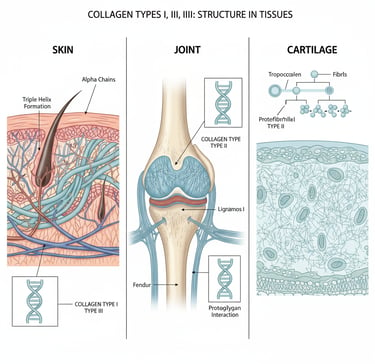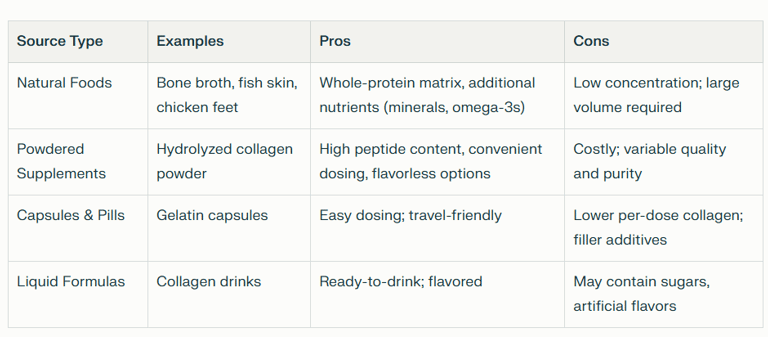Understanding Collagen: Structure, Functions, and Supplementation for American Consumers
Collagen supplements boost skin, hair, nails, and joint health. Learn benefits, best dosage, and top types for glowing beauty and improved mobility.
UNDERSTAND YOUR SUPPLEMENTS


Introduction: Why Collagen Matters
Collagen is the most abundant protein in the human body, accounting for roughly one-third of total protein content. This fibrous structural protein forms the backbone of connective tissues—skin, bones, tendons, cartilage, and even blood vessels—providing integrity, elasticity, and resilience. In the American wellness market, collagen supplements have surged by 10% annually, driven by consumer demand for anti-aging, joint support, and beauty-from-within solutions. Understanding collagen’s biology and supplement options empowers informed decisions for skin health, mobility, and overall vitality.
Collagen Types and Biological Roles
Over 28 collagen subtypes exist, but three dominate physiology:
Type I (80% of body collagen): Found in skin, tendons, bone matrix, and the cornea. It confers tensile strength and structural support.
Type II: Predominates in hyaline cartilage, intervertebral discs, and ocular vitreous. It maintains joint cushioning and flexibility.
Type III: Located alongside Type I in skin, blood vessels, and internal organs. It facilitates tissue repair, elasticity, and vascular integrity.
Natural Decline and the Need for Supplementation
Collagen synthesis declines by ~1.5% per year after age 25, exacerbated by ultraviolet exposure, smoking, poor diet, and glycation. Visible consequences include:
Decreased skin elasticity and hydration leading to wrinkles
Bone density reduction and higher fracture risk
Thinning cartilage causing joint pain and stiffness
While whole foods supply amino acid precursors, collagen peptides in supplement form enhance bioavailability to support endogenous collagen production.
Collagen Supplements vs. Food Sources
Health Benefits: Clinical Evidence
Skin & Beauty
Hydration & Elasticity: Oral collagen (2.5–10 g/day) increases skin moisture by 28% and elasticity by 15% in 8–12 weeks.
Wrinkle Reduction: Women aged 40–60 saw a 20% decrease in wrinkle depth with 10 g/day collagen peptides for 12 weeks.
Nail & Hair Strength: Collagen supports keratin matrix. Daily supplementation (5 g) led to 12% fewer broken nails and 5.5% faster hair growth over six months.
Joint & Mobility
Osteoarthritis Relief: Type II collagen (40–80 mg/day) reduced knee pain by 30% and improved walking distance in patients with mild OA.
Exercise Recovery: Athletes consuming 15 g/day collagen peptides reported 25% less joint pain and faster recovery post-exercise.
Bone & Gut Health
Bone Density: Older adults (65+) taking 5 g/day collagen plus calcium/vitamin D showed 7% increase in bone mineral density at the spine versus placebo after one year.
Gut Integrity: Collagen supports the gut lining; 10 g/day improved bloating and gastrointestinal discomfort in IBS patients over eight weeks.
Dosage, Safety, and Best Practices
Recommended Daily Dose:
Skin & hair: 2.5–10 g collagen peptides
Joints & bones: 10–15 g for peptides; 40–80 mg for undenatured Type II
Forms and Timing:
Powders: Mix with 8–10 oz water, coffee, or smoothies, best on an empty stomach for peak absorption.
Capsules: Take with meals to reduce gastric discomfort.
Liquid: Monitor sugar content; choose low-sugar formulations.
Enhancing Absorption:
Vitamin C (50–100 mg) co-consumption boosts hydroxylation of proline to hydroxyproline in collagen synthesis.
Implement a balanced diet rich in zinc, copper, and amino acids (glycine, proline, hydroxyproline).
Safety Profile:
Generally safe with minimal side effects (bloating, belching).
Allergen checks: Marine collagen may trigger fish allergies; beef/pork sources suit pescatarian restrictions.
Quality assurance: Look for NSF Certified for Sport, Informed Choice, or third-party testing for heavy metals and purity.
Lifestyle and Dietary Strategies
Sun Protection: UV radiation degrades dermal collagen; apply broad-spectrum SPF 30+ daily.
Limit Glycation: Reduce high-glycemic foods to prevent advanced glycation end-products (AGEs), which crosslink collagen and impair elasticity.
Strength Training: Mechanical loading increases collagen turnover in muscles, bones, and ligaments.
Frequently Asked Questions
Q: How long until results?
A: Skin improvements often appear in 6–8 weeks; joint benefits in 3–6 months.
Q: Can vegetarians use collagen?
A: Marine, bovine, or porcine collagen is not vegetarian. Consider vegan collagen boosters (silica, vitamin C, amino acids) instead.
Q: Is collagen safe during pregnancy?
A: Limited research exists; consult a healthcare provider before supplementing.
Q: Should I cycle collagen?
A: No strict cycling needed; daily use is safe. Assess benefits after 3 months.
Conclusion
Collagen’s vital structural functions across skin, joints, bones, and gut make it a cornerstone of anti-aging and musculoskeletal health. With robust clinical evidence supporting its efficacy and safety, collagen supplements offer a convenient, high-bioavailability option to counteract age-related declines in endogenous collagen synthesis. By integrating collagen peptides into a balanced diet, alongside lifestyle measures and nutrient co-factors like vitamin C, Americans can achieve enhanced skin hydration, joint comfort, and overall vitality.




Connect
Stay updated with our latest diet tips.
Legal
www.thedietplanner.com © 2025. All rights reserved.